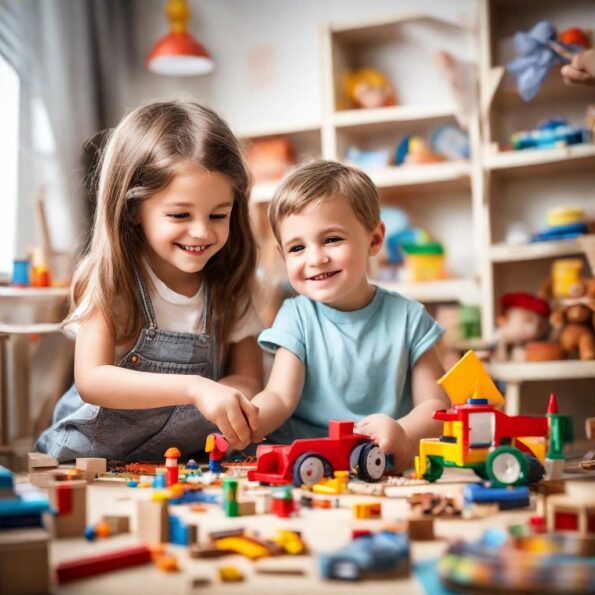


In a child’s world, play is not just a pastime; It’s an integral part of childhood, bringing joy, laughter, and endless hours of entertainment. Beyond mere amusement, research shows that toys play a crucial role in shaping children’s happiness and well-being and shaping children’s lives by fostering creativity, imagination, and social skills. As a leading advocate for children’s development and well-being, ChalkPencil is dedicated to bringing joy to kids through its innovative toy offerings.
Happiness in Toys
Numerous studies have highlighted the strong correlation between toys and children’s happiness. Toys are not just objects for entertainment; they are powerful tools that contribute to children’s happiness and emotional well-being. According to a survey conducted by the American Academy of Pediatrics, 89% of parents believe that toys contribute significantly to their child’s happiness and emotional well-being. Additionally, research published in the Journal of Child Psychology and Psychiatry suggests that children who have access to a variety of toys exhibit higher levels of happiness and satisfaction compared to those with limited toy options. Research shows that Americans spent a staggering more than $22 billion on toys, highlighting the significance of toys in our culture. ChalkPencil recognizes the importance of toys in fostering happiness and strives to provide a wide range of toys that bring joy to children’s lives.
How do toys make kids happy
Toys play a crucial role in nurturing children’s emotional development and resilience. According to Christopher Bensch, vice president of collections at The Strong National Museum of Play, “toys encompass a wide range of objects that children use for play, including household items like blankets and cardboard boxes.” Dr. Peter Gray, a renowned psychologist and author, emphasizes the importance of play in helping children express their emotions and cope with stress. The University of Cambridge researched that children who engage in cooperative play with peers experience greater feelings of happiness and satisfaction. All over, toys that promote imaginative play and role-playing help children develop empathy, communication skills, and problem-solving abilities. ChalkPencil understands the importance of open-ended toys that empower children to use their imagination and creativity. LEGO, Tinkertoys, baby dolls, and Radio Flyer wagons are examples of open-ended toys that allow children to explore and create freely.
Psychological Perspective on Toys and Happiness:
- Play is intricately linked to emotional well-being, as it allows children to express themselves and process their feelings.
- Toys serve as tools that stimulate creativity and imagination, enabling children to explore different scenarios and develop problem-solving skills.
- Interaction with toys in a social context helps children build vital communication skills and learn how to navigate social situations effectively.
In addition to promoting emotional well-being, toys also offer numerous cognitive benefits for children. Building blocks, puzzles, and educational games stimulate cognitive development by enhancing problem-solving skills, spatial awareness, and logical reasoning abilities. According to a study published in the Journal of Experimental Child Psychology, children who engage in constructive play with toys show improvements in spatial cognition and mathematical skills. Imaginative play with dolls, role-playing sets, and pretend play toys fosters creativity, language development, and critical thinking.
Risks and Challenges Associated with Toys:
- The age and developmental stage of a child play a crucial role in determining their toy preferences and the level of satisfaction derived from play.
- Gender stereotypes often influence children’s toy choices, with societal expectations shaping their preferences from an early age.
- Parental involvement in a child’s play can significantly impact their happiness, as it provides an opportunity for bonding and shared experiences.
Play is essential for children’s overall development, and toys play a central role in facilitating play experiences. Through play, children learn valuable life skills such as problem-solving, social interaction, and creativity. Good toy play allows children to explore, experiment, and discover the world around them in a safe and supportive environment.
Strategies for Promoting Genuine Happiness with Toys:
- Encouraging open-ended play allows children to explore their creativity without constraints, fostering a sense of autonomy and self-expression.
- Choosing toys that align with a child’s interests and abilities can enhance skill development and create meaningful learning experiences.
- Balancing screen time with traditional play offers a well-rounded approach to entertainment, ensuring children engage in diverse activities and maintain a healthy lifestyle.
The world of toys is constantly evolving, with digital toys becoming increasingly popular among children. Research conducted by the LEGO company’s Future Lab suggests that children no longer make meaningful distinctions between digital and physical play. ChalkPencil recognizes the importance of embracing digital technologies while also preserving the essence of traditional play experiences.
Risks and Challenges Associated with Toys:
- Overstimulation from an abundance of toys can diminish their value and hinder a child’s ability to fully engage with each one.
- The pervasive influence of marketing and consumerism can lead to children desiring toys based on trends rather than genuine interest or need.
- Addressing concerns related to materialism and excessive toy consumption is essential to promote a healthy relationship with belongings and prevent a sense of entitlement.
In conclusion, toys play a vital role in children’s happiness and development. ChalkPencil is dedicated to providing high-quality toys that bring joy, inspire creativity, and foster learning. By offering a diverse range of toys that cater to children’s interests and developmental needs, ChalkPencil aims to create a world where every child can experience the joy of play and exploration. By examining the psychological aspects, influencing factors, risks, and strategies for promoting genuine happiness with toys, this article aims to provide a comprehensive understanding of the topic and its implications for child development. Ultimately, the connection between toys and children’s happiness is a multifaceted one, influenced by various factors that require thoughtful consideration and intentional action. Remember, the true essence of play lies not in the toys themselves but in the joy and creativity they inspire in children. Let’s nurture that spark of happiness and wonder, making every playtime a memorable and fulfilling experience for our little ones.
Let’s create a world where toys are not just playthings but tools for building happy, resilient, and empathetic individuals. At ChalkPencil, we believe in the power of play to inspire, educate, and uplift children’s spirits. By offering a diverse range of toys that stimulate creativity, promote learning, and encourage social interaction, we aim to make a meaningful difference in the lives of children everywhere. So, let’s continue to celebrate the joy of play and embrace the magic of toys in shaping happy and healthy childhoods.
